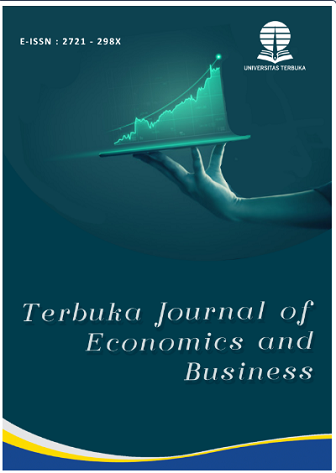The Influence of Entrepreneurial Literacy and Risk Perception on Entrepreneurial Interest in Management Study Program Students (Case Study at Open University)
Keywords:
Entrepreneurial literacy, entrepreneurial interest, Open University, risk perceptionAbstract
This study is a quantitative study that tests the influence of independent variables, namely Entrepreneurial Literacy (X1) and Risk Perception (X2) on Entrepreneurial Interest (Y) as the dependent variable. The population in this study were students of the Management Study Program of the Open University (Universitas Terbuka/UT) who were in the Distance Learning Program Unit (Unit Program Belajar Jarak Jauh/UPBJJ-UT) Kendari, with a research sample of 50 respondents. The analysis tool used in this study was Multiple Linear Regression. The results of the study concluded that: (1) Entrepreneurial literacy partially does not have a significant influence on entrepreneurial interest in students of the Management Study Program of the Open University (UPBJJ-UT) Kendari; (2) Risk perception partially does not have a significant influence on entrepreneurial interest in students of the Management Study Program of the Open University (UPBJJ-UT) Kendari; and (3) Entrepreneurial literacy and risk perception simultaneously have an influence on entrepreneurial interest in students of the Management Study Program of the Open University (UPBJJ-UT) Kendari.
References
Ajzen, I. (1991). The theory of planned behavior. Organizational Behavior and Human Decision Processes, 50(2), 179-211. https://doi.org/10.1016/0749-5978(91)90020-T
Bandura, A. (1997). Self-Efficacy: The Exercise of Control. W.H. Freeman and Company
Dihni, V. A. (2023). Jumlah Wirausahawan di Indonesia Ganjal Pertumbuhan Ekonomi. https://katadata.co.id/analisisdata/6464b3d3c584e/jumlah-wirausahawan-di-indonesia-ganjal-pertumbuhan-ekonomi, accessed August 20, 2024
Dirjen Pendidikan Vokasi, Kemendikbudristek (2022). Ini Manfaat Kamu Ikut Program Mahasiswa Wirausaha!, https://vokasi.kemdikbud.go.id/ read/b/ini-manfaat-kamu-ikut-program-mahasiswa-wirausaha, accessed August 20, 2024
Fatoki, O. (2014). The Entrepreneurial Intention of Undergraduate Students in South Africa: The Influences of Entrepreneurship Education and Previous Work Experience. Mediterranean Journal of Social Sciences, 5(7), 294-299. http://dx.doi.org/10.5901/mjss.2014.v5n7p294
Hattab, H. (2014). Impact of Entrepreneurship Education on Entrepreneurial Intentions of University Students in Egypt. The Journal of Entrepreneurship, 23(1), 1-18. http://dx.doi.org/10.1177/0971355713513346
Kemenko Perekonomian R. I. (2022). KUR Goes to Campus, Upaya Meningkatkan Minat Mahasiswa untuk Menjadi The New Entrepreneur, https://ekon.go.id/publikasi/detail/3944/kur-goes-to-campus-upaya-meningkatkan-minat-mahasiswa-untuk-menjadi-the-new-entrepreneur, accessed August 25, 2024
Khofifah, A., T., N., & Drifanda, V. (2023). Pengaruh Literasi Kewirausahaan Dan Minat Berwirausaha Terhadap Perilaku Berwirausaha Mahasiswa Pendidikan Ekonomi Universitas PGRI Semarang. Jurnal Spirit Edukasia, 3(2), 344-350, https://journal.upgris.ac.id/index.php/spiritedukasia/ article/view/16432/7827
Kominfo R. I. (2016). Kominfo Luncurkan Gerakan Nasional 1000 Startup Digital, https://www.kominfo.go.id/content/detail/7689/kemkominfo-bersama-kibar-luncurkan-gerakan-nasional-1000-startup-digital/0/berita_satker, accessed August 25, 2024
Maslow, A. (1943). A theory of human motivation. Psychological Review, 50(4), 370-396. https://doi.org/10.1037/h0054346
Sarwono, J. (2006). Quantitative and Qualitative Research Methods. Yogyakarta: Graha Ilmu
Shane, S., & Venkataraman, S. (2000). The Promise of Entrepreneurship as a Field of Research. Academy of Management Review, 25(1), 217-226. http://dx.doi.org/10.2307/259271
Shinnar, R. S., Hsu, D. K., & Powell, B. C. (2012). Self-efficacy, entrepreneurial intentions, and gender: Assessing the impact of entrepreneurship education longitudinally. The International Journal of Management Education, 12, 561-570. https://doi.org/10.1016/j.ijme.2014.09.005
Smith, A. (2007; orig. publ. 1776) An inquiry into the nature and causes of the wealth of nations. New York: Metalibri, https://www.ibiblio.org/ml/libri/s/SmithA_WealthNations_p.pdf
Souitaris, V., Zerbinati, S., & Al-Laham, A. (2007). Do entrepreneurship programmes raise entrepreneurial intention of science and engineering students? The effect of learning, inspiration and resources. Journal of Business Venturing, 22(4), 566-591. https://doi.org/10.1016/j.jbusvent.2006.05.002
Sugiyono (2018). Metode Penelitian Evaluasi: Pendekatan Kuantitatif Kualitatif dan Kombinasi. Bandung: Alfabeta
Turker, D., & Selcuk, S. S. (2009). Which factors affect entrepreneurial intention of university students? Journal of European Industrial Training, 33(2), 142-159. http://dx.doi.org/10.1108/03090590910939049
Walter, S. G., & Dohse, D. (2012). Why mode and regional context matter for entrepreneurship education. Entrepreneurship & Regional Development, 24(9-10), 807–835. doi:10.1080/08985626.2012.721009
Yuana, S. L., dkk. (2017). Kuasa dalam Rantai Industri Berbasis Inovasi: Studi Komparasi Model Pengembangan Inovasi dalam Inkubasi Bisnis Teknologi Informasi di Jakarta, Bandung, dan Yogyakarta. Penerbit PolGov. https://polgov.fisipol.ugm.ac.id/wp-content/uploads/sites/1667/2022 /02/2018-monograf-kuasa-dalam-rantai-industri-berbasis-inovasi-ebookcompressed.pdf, accessed August 25, 2024
Downloads
Published
How to Cite
License
Copyright (c) 2024 Terbuka Journal of Economics and Business

This work is licensed under a Creative Commons Attribution-ShareAlike 4.0 International License.




